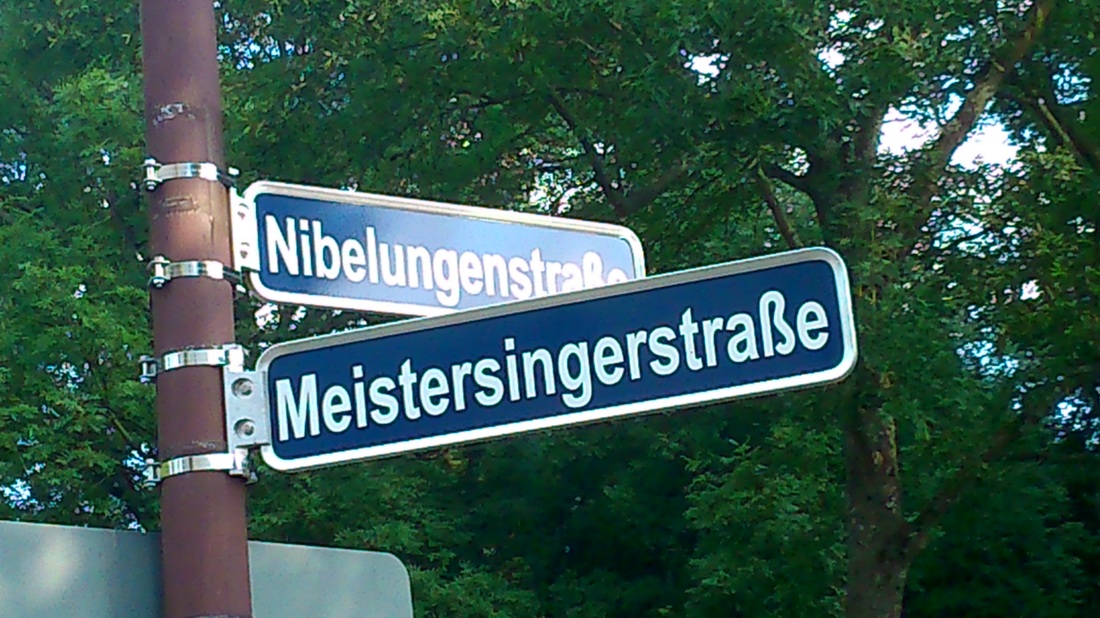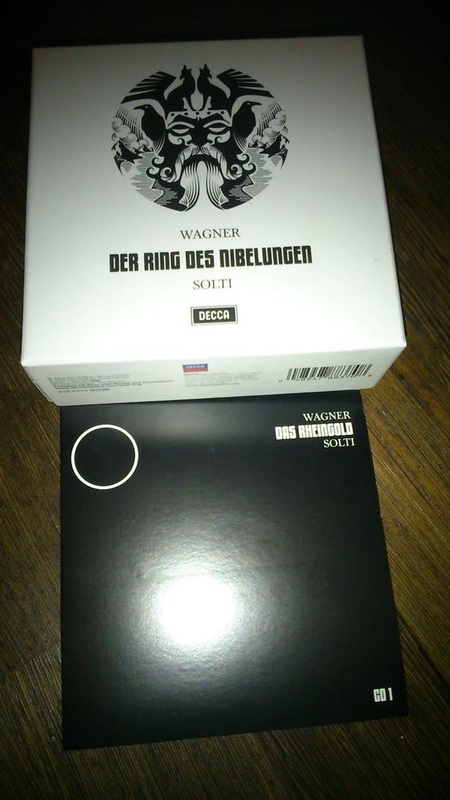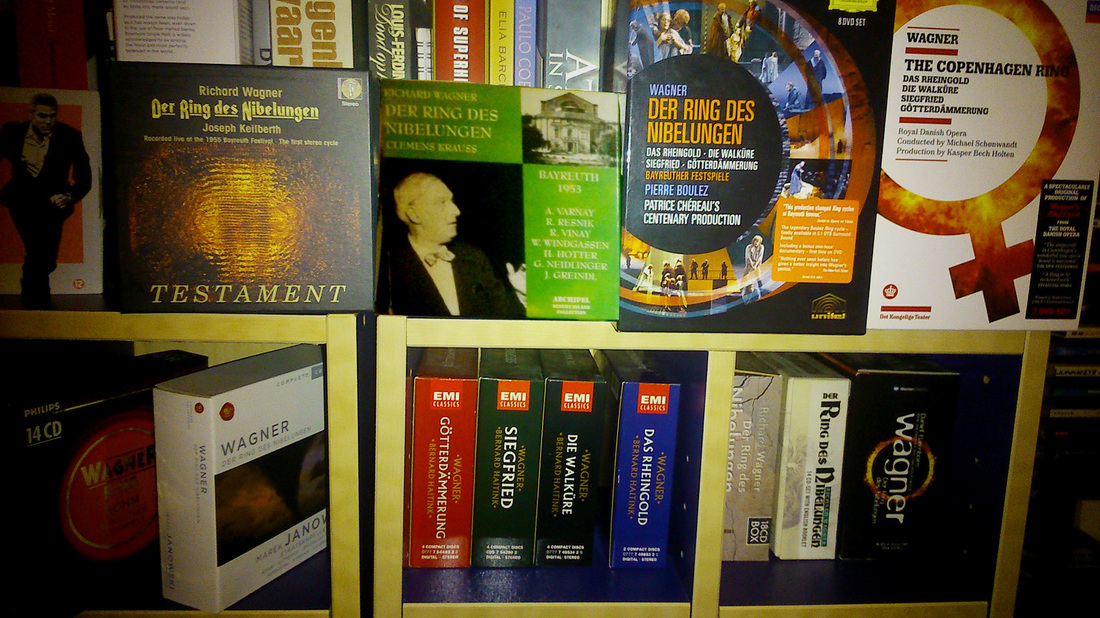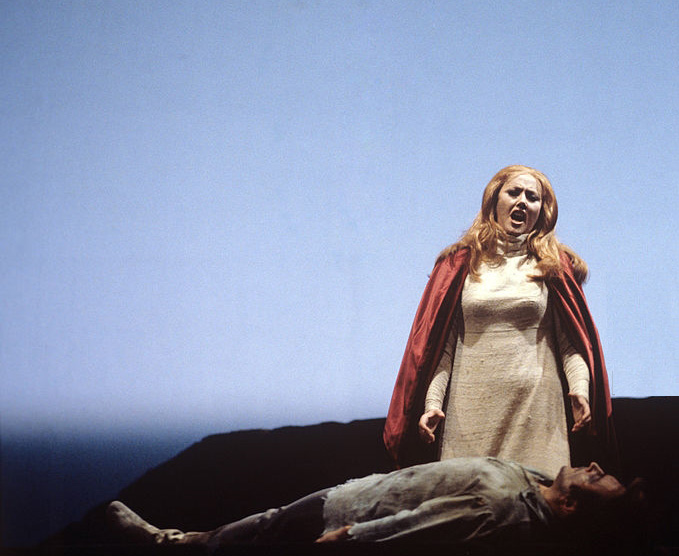|
This summer I don't go to Bayreuth so for my shot of Wagner operas in August I am limited to my own home theater. I do hope to go next year (again) when Parsifal gets a new production and hopefully I can treat myself on a double bill together with the latest Tristan. The last couple of weeks I have lived the embarrassment of richness with two pursued Ring recordings that took me on a trip to the world of the Nibelungs. The 2012-remastering of the Solti Ring and a Bayreuth-cycle from the Boulez-Chéreau production from 1977. Not being embarrassed enough I have completed that set with a Bayreuth live recording of Tristan und Isolde with Carlos Kleiber from 1976 (the Boulez and Kleiber recordings are both obtained from Opera Depot). An embarrassment of richness indeed. All hail to the first studio Ring that Georg Solti recorded with John Culshaw between 1958 and 1965 but is was never my personal favorite. That was mainly because of Solti's style of conducting that is too nervous and concentrates more on the fortissimo's in Wagner's score than on its structure. Solti has for lyricism as little taste as Slayer has for writing a ballad (perhaps a cross-reference that is a little too far-fetched but this is the Wagner & Heavy Metal website). But with all things these Ring lacks, it remains a pivotal recording that brought the music theater of Richard Wagner into the living room. Something Wagner himself, without the awareness of recorded sound, could never have dreamed of. One complete Ring-cycle he saw, in 1876 in Bayreuth, and he was not completely satisfied with it. In fact, he was pretty grumpy about it. He had a lot of complains about both the musical output as the staging. You run a serious risk when your ambition is to create the artwork of the future: chances are big that you will not see a satisfying result materialize in your lifetime. It was not finished in 1876, and 140 years later, we're still not done with it. Now in 2015, I own 20 complete Ring cycles which are available to me at anytime I want. Recordings from both Bayreuth and the studio. Notes on paper are not music. They become music when you release them to time and gravity. And all those recordings show how different the results of that process can be. It were those differences in output considering Ring recordings that saved me from the idea that a piece of (classical) music should have a definitive version. From that point of awareness on, the CDs in my record collection started to grow into serious numbers. Because why would you stay with one version of a piece when you can have several at your disposal? Another place in the spectrum of Ring recordings is taken by the Boulez-Chéreau production that premiered in 1976 in Bayreuth's centennial fest and provoked a scandal. Setting the stage in a time when the cycle was conceived, a time of the Industrial Revolution, this French Ring was further away from a Teutonic calling for arms than many in the audience, who expected a more traditional staging for this jubilee Ring, were willing to accept. In Boulez you find the antidode of Solti. Having been nicknamed Mr. Sangfroid (Mr. Cold-blood) Pierre Boulez is not the man to spice up a score. But he is your man when it comes to respecting the score and its structure. A structure Wagner so meticulously crafted. In Karajan's approach of the Ring, Boulez first heard someone who respected the chamber music qualities in this music. An approach that presumes that the impact of the drama in Wagner's music is best served when you can hear everything that is going on in the orchestra. Rather than emphasize individual leitmotifs and fortissimo's, Boulez relies on the talent of Wagner as an architect who erected his monumental musical building with an unequal sense of structure. But that structure has to be recognized by its interpreter and it is there where Solti falls short. The Bayreuth recording from 1977 is slower than the commercial release on Philips from 1980 but in comparison to Solti , Boulez is a speed demon. But a speed demon that never misses a beat. Treating Wagner's Ring as an audio-only drama, the Solti Ring is seasoned and spiced up in the studio. It adds sounds that have to enhance the home theater experience. And with Solti leaning heavily on the brass (by times it's like the cavalery is coming to town) the result is sonically impressive. In summer weeks like these it's great to play this Ring with windows open (giving the neighbourgs their share of Teutonic enlightenment). But that approach and those additional sounds also do for Wagner's music what 3D does for movies. It delivers undeniable moments of brilliance but it comes at a cost with the natural development of the story disturbed and a somewhat artificial result in the end. Comparing the Solti and Boulez Ring I have to give the latter the nod when it comes to orchestral sound (transparent and with a natural flow). Boulez may top Solti in his orchestral approach his singers can't match the Ring of late Georg. Kirsten Flagstad, a legendary voice from the mono age, George London, Hans Hotter, Wolfgang Windgassen and of course Birgit Nilson as Brunnhilde formed a cast that isn't topped since. Expecially Hans Hotter benefits from the improved 2012-remastered sound. For the real Hans Hotter-as-Wotan-show in stereo one better turns to the Bayreuth Keilberth Ring from 1955. But in this latest remastering he sounds stronger than on the previous version I owned (which had Das Rheingold spanned over 3 discs) and a lot less than an old man in need for his asthma medicines. The summer of 1976 in Bayreuth was something special. Together with the premiere of the Boulez-Chéreau production of the Ring, there was a production of Tristan und Isolde under the baton of Carlos Kleiber. Kleiber is a magician with Wagner's score. Like Boulez he is able to turn the music in a kind of perpetual motion machine that is impossible to resist. His studio recording with René Kollo and Margaret Price sounds detached compared to this performance. I love the beautiful Isolde of Margaret Price but I am not very fond of René Kollo's Tristan. Kleiber's singers here are Spas Wenkoff as Tristan and Caterina Ligendza as Isolde. Wenkoff is a revelation for me. His Tristan is a sensitive, noble man. I only knew Ligendza from the Böhm-Friedrich production of Strauss' Elektra in which she sang Chrysothemis. Together with Wenkoff she forms a beautiful love couple here. Where Birgit Nilson gives Isolde almost superhuman powers Ligendza give this character more human qualities. The same goes for Wenkoff's Tristan so here Wagner's cathedral of sound has inhabitants of real flesh and blood. It's a pity that the scope of Kleiber's commercial releases and performances was pretty limited. Listening to this live recording (and his live recordings from Mahler's Das Lied von der Erde, Strauss' Elektra and Berg's Wozzeck) one can only conclude that he had more to offer to the German-Austrian musical repertoire than many. To his Tristan from Bayreuth I will return, that's for sure. It has become my current favorite rendition of this opera. Caterina Ligendza as Isolde and Spas Wenkoff as Tristan
0 Comments
|
TIMELINE
July 2024
|





 RSS Feed
RSS Feed